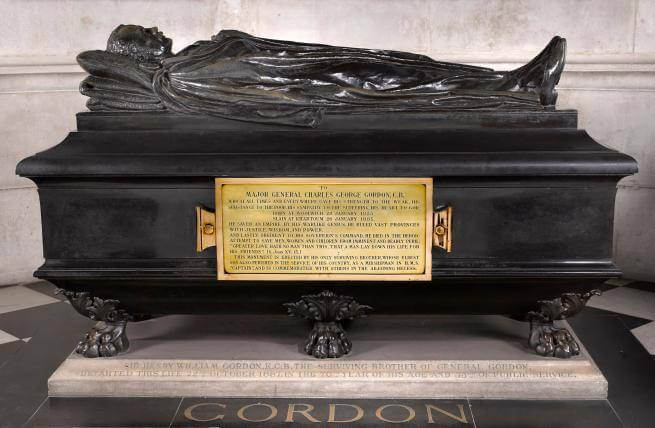Charles George Gordon (1833-85)

Image courtesy of Pantheons: Sculpture at St Paul's Cathedral.
Charles George Gordon
1833-85
Part of The East India Company at St Paul’s: A digital trail produced in collaboration with Stepney Community Trust.
Written by Amrita Shodhan, homemaker and Senior Teaching Fellow, SOAS, University of London.
The following text is available in Bengali, Gujurati, Urdu, Hindi, Punjabi, and Tamil. Please email CollectionsDepartment@stpaulscathedral.org.uk to request a copy.

![]()
Charles Gordon is remembered as a Christian soldier of great energy and resourcefulness who, having descended from four generations of army officers, fought for his Queen in large parts of the empire. His letters and biographies, and his popularity in newspapers and later on film, made him a great national hero. His statues and busts exist in both large-scale and miniature form across the country. Charles Gordon’s commemoration here demonstrates Britain’s military prowess, and ability to recruit individuals to fight and die for it.
Charles Gordon was employed by the Corps of Royal Engineers but volunteered to fight in China with the British armies, which included troops from India. His role shows the cooperation and coordination between the various entities of the East India Company in India, China, and the British Government. The East India Company had expanded the opium trade to fund its purchase of Chinese tea, silk, porcelain and other products. The Company forced peasants in Bengal and Bihar in India to produce opium by various legal as well as underhand means, and monopolised its processing and exports. Many scholars agree that the forced production of opium led to the widespread impoverishment of Indian peasants during this period which, along with other British commercial and revenue policies, contributed to a general regime of under-development. This situation eventually contributed to large labour flows out of India, including by indentured labourers, lower caste workers, and the educated middle classes.
Gordon volunteered to fight in a war that the British initiated for commercial gain - namely, the right to sell Indian opium to China. On winning the Second Opium war in 1860, he and his comrades looted the Summer Palace in Peking (Beijing) and burnt it down. Gordon criticised the burning and looting as 'vandal-like' in a letter home, but he benefitted from the loot and in the same letter reported 'I have done well' and 'Everybody is wild for plunder'. He brought home, among many other things, a throne to place in his regimental headquarters at Chatham (and now in the Royal Engineers Museum in Gillingham). The sale of opium in China was legalised as part of the spoils of this victory.
Gordon remained in China after the war, to help protect British interests there with the now compliant Qing emperor. He led local mercenary troops to suppress the Taiping rebellion against the Qing emperor. The Taiping ideology promised equality of the sexes as well as classes, and shared property. 30 million people or more died in China during the years of the rebellion, more than any other single war of the century. Gordon’s success propped up the Qing emperor and earned him the position of mandarin in the Chinese army. Later in the 1880s, Gordon was sent to provide military aid to the British backed Egyptians occupying the Sudan. Gordon died in the Sudan, killed by the Sudanese rebels. The rebellions in both China and the Sudan, which Gordon worked to suppress, show how the British propped up compliant – but deeply unpopular – regimes in colonial locations.
For detailed information about this monument, visit the Pantheons: Sculpture at St Paul's Cathedral website.

The East India Company at St Paul's
Explore the full digital trail produced in collaboration with Stepney Community Trust.




